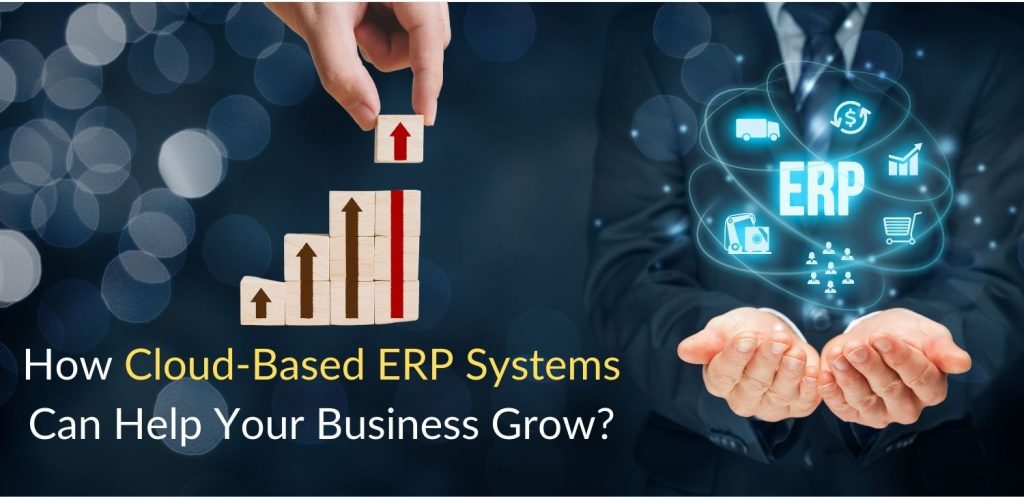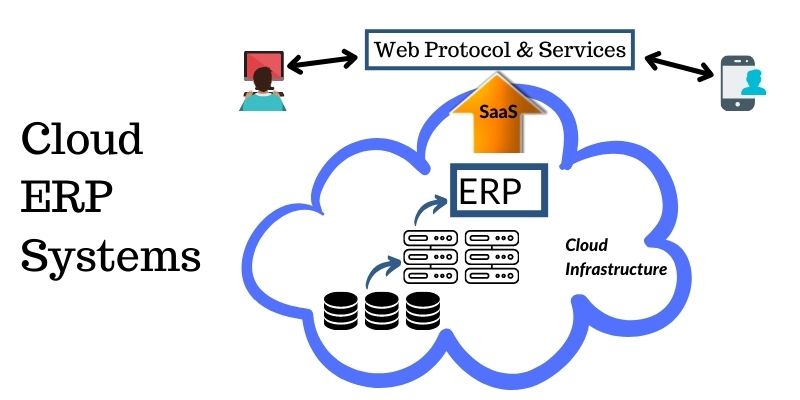
The business world is quickly moving to cloud-first strategies. Thanks to the increasing sophistication and security measures most cloud vendors offer, software as a service (SaaS) is becoming a trend over traditional on-premise solutions.
More and more businesses are now realizing the benefits of migration to the cloud or using cloud services and are reinventing themselves inside out to keep up with the market. Stats show that the cloud migration services market was valued at $119.13 billion in 2020. Furthermore, it is expected to hit the $448.34 billion mark by 2026 at a CAGR of 28.9%. Looking at these numbers, it is clear that cloud adoption will only increase in the coming years.
There are many reasons behind that. From being cost-effective and scalable to providing a lot more agility and scope for innovation, cloud adoption has various benefits for many business aspects. And one of these aspects that the cloud revolution is changing is enterprise resources planning (ERP).
For the uninitiated, ERP is a business management software that integrates a company’s various activities like supply chain, operations, commerce, reporting, etc. It lets users manage them in a streamlined way. You can think of ERP software as a single and scalable system that binds various aspects of a company. From data connectivity within the ERP system to data from productivity tools, customer engagement solutions, etc. ERP software couples all the data together. Furthermore, a layer of AI integrated with these systems helps business runners gain crucial insights and make better business plans. On top of connectivity and ease of management, ERP software also offers flexible deployment options, better security and privacy, and low-code customizations.
But even though ERP software is an amazing tool for businesses looking to streamline their inner processes and cut out any resource wastage, on-premise ERP software implementations are tough to manage. Most companies these days are opting for cloud-based ERP software, and in today’s blog, we’ll learn how cloud-based ERP systems can help your business grow,
What are cloud ERP systems?
Cloud ERP is a software as a service that allows users to use ERP solutions running on cloud vendors’ servers over the internet. Not only does cloud ERP give businesses all the functions, tools, and benefits that a traditional on-premise ERP solution does, but it also eliminates all of its shortcomings, making it the perfect tool for SMBs.
Cloud infrastructure and services allow small and medium-sized businesses to get the same tools as bigger players in the market but at cost-effective rates and with the flexibility to scale up and down according to the changing needs.
There are plenty of cloud ERP vendors in the market that provide great tools for businesses of all sizes. A typical cloud ERP looks something like the architecture given below.

Since the ERP solution is on the cloud, it is accessible anywhere, provided the person trying to gain access has the right credentials. Furthermore, anybody can access these services using a normal internet browser which adds a further layer of ease.
On the surface, the only difference between on-premise and cloud ERPs is where the server lies. But there are plenty of benefits to using cloud-based ERP systems beyond that, and in this blog, we will learn about some of them.
Benefits of using cloud ERP systems for your business
While anyone who knows even a little about cloud services can tell you that the biggest advantage of migrating to the cloud is cost cuts, there are plenty of other benefits to it as well. While cost cut is one of the biggest reasons people choose cloud ERP over traditional on-premise ERP, other benefits include streamlined deployment strategies, increased visibility, and collaboration opportunities, enhanced security, etc. Let’s take a look at each of these benefits in-depth:
Cloud-based ERP systems are cost-effective and require less starting capital
The biggest and most obvious benefit of cloud-based ERP systems is that they cost less and require less upfront capital to set up.
Cloud ERP turns capital investment into ongoing expenses, thus eliminating the need to cut a big check right at the beginning. Most SMBs don’t have the kind of money it takes to set up their own on-premise ERP systems. Thus going the SaaS way is their best bet. Hardware infrastructure, hardware and software maintenance, employee training, and other costs can be significantly cut down using cloud ERP systems. Since companies don’t have to worry about running and maintaining their own server rooms and hiring an IT staff to provide support, they can focus on their core business.
Cloud ERP software also allows SMBs to scale up and down without investing too much money upfront. This helps them grow and build stronger foundations.
Cloud-based ERP systems streamline deployment strategies
Whenever companies are trying to bring about a big change in how they function, there are many things to consider. In a company, there are many departments, and all of them have their challenges and way of working. So when a company-wide innovation is deployed, it affects them all in different ways. This is especially true for on-premise ERP systems. On-premise ERP deployment is a long and arduous process and creates a lot of disconnect between different departments and the IT team, which is constantly trying to keep up. This leads to production stoppages, resource wastage, and many other problems.
Cloud ERP systems streamline deployment strategies. Innovation is much easier on the cloud because you don’t have to implement it on a departmental level. You can implement those changes across the company. And thanks to the highly intuitive and smart tools that cloud ERP offers, the requirements of each department are anticipated beforehand, and proper measures are taken to ensure continued operation. While on-premise deployment takes about 12 months to complete, cloud ERP deployment only takes about 3-6 months, and it is much more efficient.
Also Read: Cloud Migration Strategy: Driving Your Business Growth
Cloud-based ERP systems offer more transparency and better collaboration opportunities
For any company to work efficiently, it requires seamless intra-departmental communication and collaboration strategies. It happens all too often that due to communication gaps, the true goals of a strategy are lost, leading to inefficient implementation. This can hurt the company in the long run, and it is something that business owners need to take care of.
Thanks to countless communication and collaboration tools, cloud ERP systems make it easier for people in different departments to work together. And since these solutions are always online, they are way more accessible, making it less likely that any message or notification will be lost or go unseen.
Cloud ERP also offers transparency. There are many collaboration tools online where people working on the same project or interlinking projects can see what other team members are working on. Furthermore, people at the top can keep a firm gaze over how things are progressing, how each task/ticket is being dealt with, etc.
Coming to the financial aspects of the company, cloud ERP allows people to monitor their financial health in real-time. It makes it easier for them to study data, find patterns, and use AI-based analytical and other business tools to create better strategies.
Finally, cloud ERP systems keep track of every resource in the company. Whether it’s an engineer or a system, all the resources are accounted for, and their current tasks are being tracked. It helps business owners ensure that all company resources are being utilized efficiently.
Cloud-based ERP systems provide better security
One of the biggest reasons many companies are still using on-premise infrastructure is the perception that cloud networks are unsafe. While historically, the cloud has struggled to provide as strong security measures to companies as their legacy infrastructure, things are very quickly changing.
These days, most cloud vendors provide an assortment of high-tech cloud security tools that keep your data safe. With the growing emphasis on data security, some vendors even provide additional security benefits that are not possible with on-premise. Automatic system-wide flaw and vulnerability detection, multiple fail-safes, data duplicates, a team of highly skilled cloud security experts working for the cloud vendor, and many such security benefits are now provided by cloud vendors.
While cloud vendors do their part, it also falls on the company to ensure they don’t cause any security crisis, such as exposing data on insecure networks, etc. But these things can be stopped by properly training your workforce and implementing some guidelines.
Cloud-Based ERP systems provide a faster innovation pace
To increase company efficiency, newer and faster tools are required. However, for on-premise ERP systems, it’s a long process that can lead to many problems, even production stoppages. Furthermore, if it’s not a software update and new hardware is required, new servers have to be bought, new processing units, new cooling systems, etc. that adds more cost. But with cloud ERP systems, this is not the case. Updates and innovations are faster and happen across the company simultaneously.
Furthermore, you don’t really need to upgrade your infrastructure. You have to change your cloud vendor contract to get the new services you need. This will be way less costly than the other approach.
Cloud-Based ERP systems are highly scalable
Scalability is a key point of consideration for businesses that operate in volatile markets before they sign on to a cloud vendor. A sudden surge or drop in demands requires immediate expansion or compression of operations, which means either more resources have to be acquired or some resources have to be retired. In both cases, on-premise ERP is incredibly slow and requires a lot of effort and cost.
On the other hand, cloud ERP systems allow companies to increase or decrease their resources quickly. Simply changing your contract with the cloud vendor allows you to acquire more resources such as data space, computing machines, etc. when the market is booming. Similarly, companies can quickly scale down if their resource requirements have gone down.
Cloud-based ERP systems add more mobility to businesses
Another disadvantage of legacy ERP systems is that they can’t be accessed everywhere, thus restricting their use. On the other hand, cloud ERP systems let people log into their company cloud servers from wherever they want. All they need is a stable network connection, and they can log into their company’s cloud ERP systems. This opens many doors for distributed and hybrid working, which is becoming a rising trend in the wake of the COVID pandemic.
Also Read: Explore how tailored retail ERP software solutions can streamline operations, enhance customer experiences, and drive business growth through custom ERP development.
Conclusion
Cloud migration and adoption are a growing need for every modern-day business. Legacy on-premise systems can’t match the ease and seamlessness brought on by cloud services. To keep up with the market and meet the growing demands, more and more companies are migrating to the cloud and opting for cloud-based ERP systems.
If you want to create your very own ERP system that runs on cloud servers, then Matellio is your bet. We have years of experience working with AWS and Azure environments, and our talented cloud experts know how to create cloud apps with great care and in a way that provides the most value to our customers. Our agile and client-centric development approach allows us to understand the requirements of our clients and deliver projects that meet their targets.
If you are looking to hire a cost-effective cloud developer, contact us today and get a free quote for your project.





